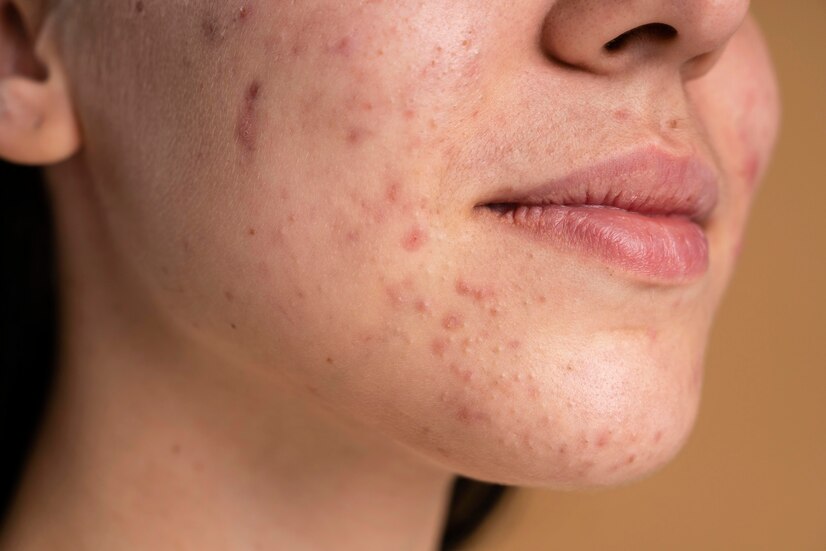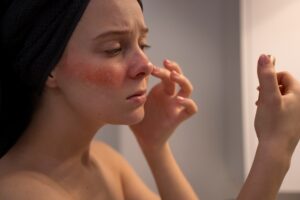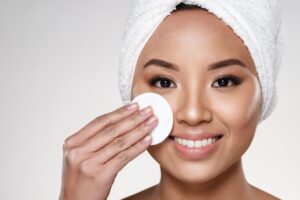Acne is a common skin problem that affects pretty much everyone at some point, especially teenagers. But what exactly is it, and why does it appear seemingly out of nowhere? In this article, we’ll explore all that there is to know about acne: the triggers, prevention, and treatments for this skin condition.
So, without delay, let’s get started!
Why do you have ACNE?
On the skin, hair follicles contain sebaceous glands, which produce oil called sebum that helps to keep the skin hydrated and healthy. However, sometimes, things get a little out of hand. I’ll explain.
Over time, dead skin cells start piling up inside the follicles. This buildup, combined with increased sebum production, can clog the pores, causing inflammation upon bacterial action. This whole situation leads to acne or pimples on the skin.
However, while clogged pores are the root cause, there are a bunch of other things that can trigger acne breakouts or make existing acne worse. We’ll discuss these.
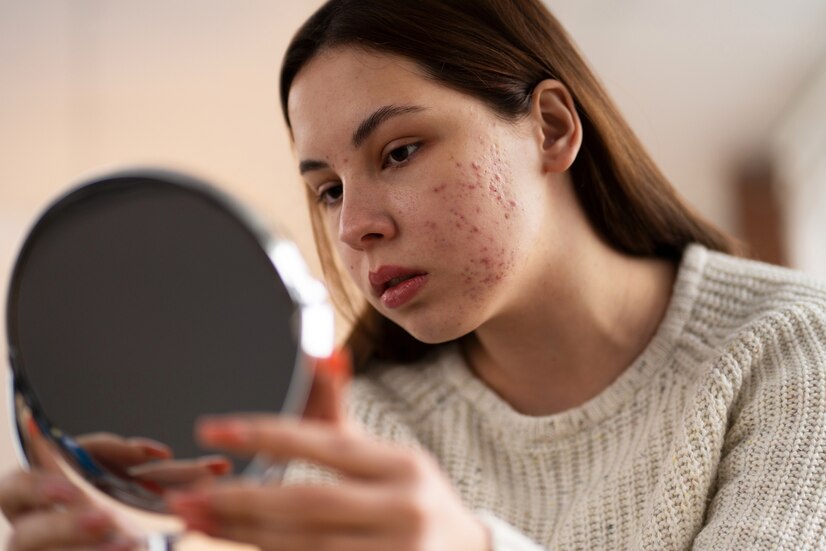
Common Triggers For Acne
Hormonal Changes
Hormonal changes, especially the rise in androgens, which are present in both men and women, can increase sebum production, leading to clogged pores. Women might also experience breakouts around their periods due to hormonal fluctuations.
Diet
There is a popular saying that you are what you eat, and to be honest, it can’t be truer than that. What we eat can often be the biggest culprit for our skincare woes, and we just might not know it.
While a single pizza night probably won’t wreak havoc, a diet consistently high in sugary or processed foods might contribute to breakouts. And yes, the saying that “grease makes acne worse” is definitely true. So you have to be mindful of your intake of unhealthy fat.
Stress and excess sweat
If you’re constantly stressed or overwhelmed with work, then that may be an invitation to acne and breakouts. Stress can trigger the release of cortisol, a hormone that can increase oil production and worsen acne. So taking steps to manage stress, like meditation or exercise, can benefit your mind and your skin.
Also, after sweating, ensure you wash up as soon as possible to prevent clogging your pores with dirts that has been trapped in sweat.
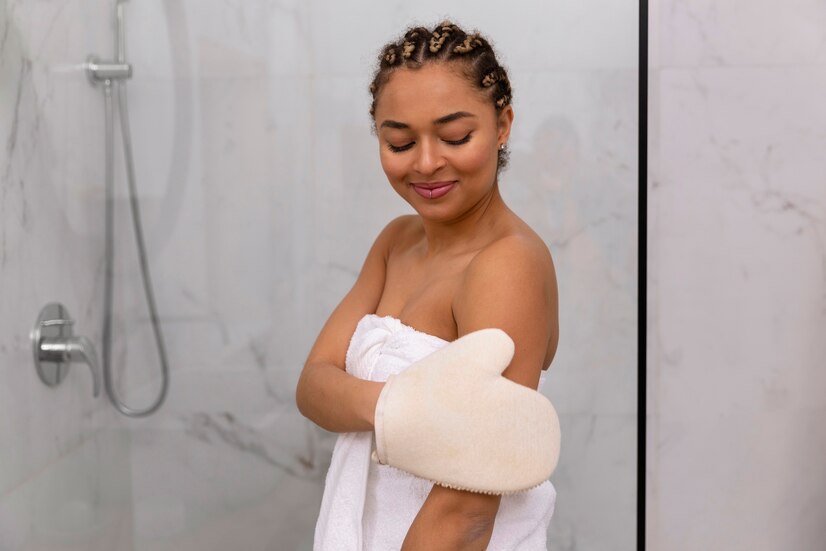
Picking and Poking
Everyone probably knows how tempting it is to get rid of pimples with a good squeeze, but I strongly advise that you resist the urge. While it may seem like the perfect remedy, picking at your face can worsen inflammation and even lead to scarring.
Targeted Spot Treatments or Acne
Now that you know the possible triggers for acne, let’s talk about some effective spot treatments you can adopt.
Unlike cleansers and moisturizers that work on your whole face, spot treatments target individual pimples. They come in various forms like gels, creams, or patches, each containing powerful ingredients to tackle different aspects of a breakout. And here are some examples;
Benzoyl Peroxide
This superstar ingredient is a go-to for many, and it works by killing acne-causing bacteria and reducing inflammation.
However, benzoyl peroxide can dry and irritate, especially for sensitive skin. So you may need to start slowly and ease into using it to avoid redness and peeling.
Salicylic Acid
Another important product is salicylic acid. This gentle exfoliant helps unclog pores by getting rid of dead skin cells and excess oil. It can also prevent future breakouts.
Salicylic acid is a good option for sensitive skin patients who can’t tolerate benzoyl peroxide.
Sulfur and Tea Tree Oil
Sulphur has long been used to reduce oil production and inflammation. Although it has a not-so-pleasant odor, sulphur can be quite helpful in treating acne.
Let me also say, though, that there’s no one-size-fits-all approach when it comes to spot treatment. The best choice for you depends on the type of pimple you’re dealing with. But whichever you choose, know that when applying spot treatments, you must do so on clean, dry skin. Also, a little goes a long way, so start with a small amount and focus directly on the pimple.
Preventive Skincare Routine for Acne
While it’s good to know the triggers and treatments for acne, I think it’s even more important to know how to prevent these breakouts in the first place.
By creating a preventive skincare routine and making some lifestyle adjustments, you can control your acne and achieve clearer and healthier skin. So, let’s explore the details.
Take facial cleansing seriously
Proper cleansing can prevent many skin conditions. If you want to keep acne and breakouts at bay, washing your face twice a day, morning and night, is crucial.
This removes excess oil, dirt, and dead skin cells before they can clog your pores.
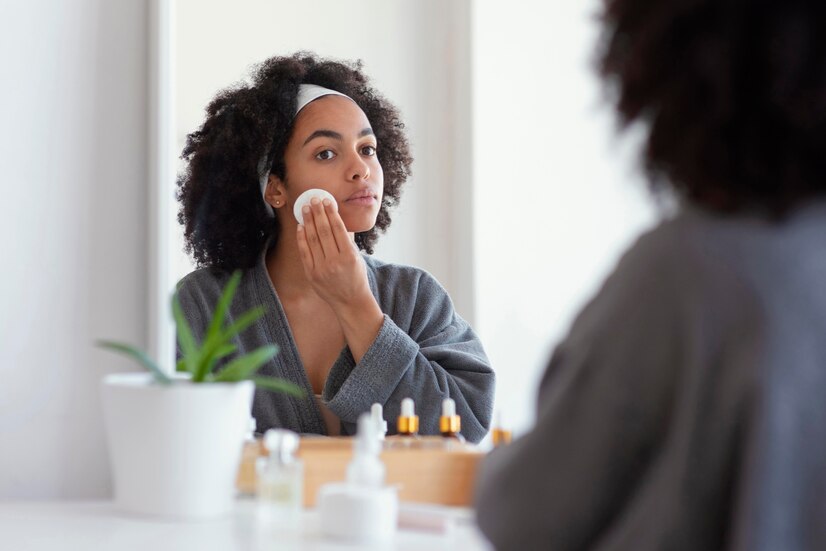
Moisturize Properly
Just because you have oily skin doesn’t mean you can skip moisturizer. An oil-free, non-comedogenic moisturizer can help because it keeps your skin hydrated, preventing it from overproducing oil to compensate for dryness.
So, whether you have dry or oily skin, always moisturize. This is a sure way to keep your skin balanced and happy.
Exfoliation and Protection
Exfoliation helps to remove dead skin cells that can clog pores. You can do this by using a gentle exfoliating scrub or chemical exfoliant a couple of times a week.
Also, sun exposure can irritate acne and even worsen scarring. So make sunscreen a non-negotiable part of your daily routine, even on cloudy days.
Chose your products wisely
While products such as lotions, creams, and makeup can be lifesavers for our beauty routines, you need to be mindful of comedogenic products—these can clog pores. Instead, look for non-comedogenic and/or oil-free labels when choosing skincare and makeup.
Lifestyle Tweaks
Taking care of your skin goes beyond what you put on it. Some lifestyle tips, such as diet, can help reduce the appearance of acne.
While there’s no one-size-fits-all acne diet, some research has proven that there is a link between high-glycemic foods and breakouts. Also, taking too much unhealthy fat can also cause the appearance of acne.
So consider limiting sugary drinks and processed foods and focusing on a balanced diet rich in fruits, vegetables, and whole grains.
Stress management can also be an effective way to prevent acne. While it can be difficult to control one’s stress level, finding healthy ways to manage stress, like exercise or meditation, can help regulate your hormones and potentially reduce breakouts.
Similarly, there are hygienic habits that can be helpful, too. For example, wash your pillowcases and bedcovers regularly to prevent bacteria transfer. Also, avoid touching your face throughout the day, especially with dirty hands. You’d be amazed at how these simple habits can make a big difference.
Acne is a common skin condition, and there’s no shame in having it. Understanding what triggers your breakouts and making some lifestyle adjustments can keep those unwelcome visitors at bay and achieve clearer and healthier skin.
Also, please remember that consistency is key. Sticking to a good skincare routine can take time to show results so you don’t have to get discouraged if you don’t see a change overnight.
Be patient with your skin. If acne persists, consult a dermatologist for personalized advice and treatment options.

